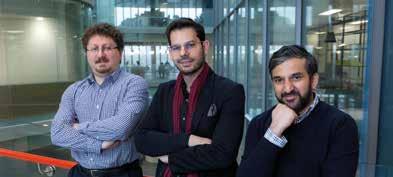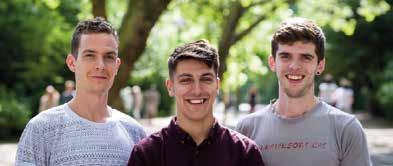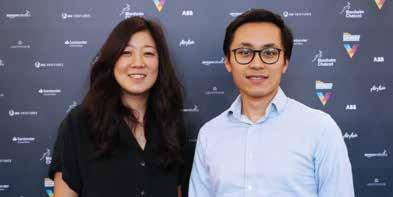
15 minute read
Creating a climate for change

Imperial prides itself on using the power of its world-class research and innovation to combat global challenges, and there is no bigger threat to the future of humankind and our planet than climate change.
Advertisement
It’s been 30 years since the detrimental effects of climate change first became front-page news. This was the result of over a century of accumulating scientific research and changing perceptions. But despite knowing the increasing damage being done to our planet, targets set by the 2015 Paris Agreement are still not being met. Imperial has been at the forefront of the global fight against climate change, using relationships across industry, government and civil society to find meaningful solutions to climate change. It has done this through collaborating on new technologies, influencing behavioural change, and sparking conversations that challenge conventional thinking and initiate new debates. At the heart of Imperial’s work on climate change is the Grantham Institute – Climate Change and the Environment was set up in 2007 with the support of Jeremy and Hannelore Grantham. The Granthams’ contribution comprised the largest sum of private funding given to climate change research in the UK at the time.
“The Granthams had been, and remain, very concerned about climate change, especially about the distortion of the science, and the fact that leadership around the world was not getting on with the things that really mattered,” says Professor Richard Templer, Director of Innovation at the Grantham Institute.
Professor Templer has been at the Grantham Institute since its inception, and felt passionate about how Imperial should be combatting climate change: “People kept on arguing about the science of climate change, and I found that frustratingly irrelevant, when it was clear that the scientists were saying this was happening. I thought we need to turn our attention to actions. Imperial is a huge treasure trove of knowledge and creativity, from staff through to the students, and we should really be doing something about this.”
The Grantham Institute has now been running for over 10 years, and “has grown into something that you dreamed of, but didn’t think was going to happen. It has become this incredible connective tissue across the College bringing together everything that we do in climate change,” Professor Templer explains.
As well as connecting research and innovation across Imperial, the Grantham Institute has also been hugely successful in supporting startups tackling climate change and environmental issues. It does this through the Climate-KIC accelerator which supports earlystage clean-technology businesses, and Climate Launchpad, the world’s biggest green ideas competition.
Imperial currently accepts an annual cohort of up to 10 startups, attracting applications from across the country. The accelerator offers business coaching, workshops, masterclasses, and networking opportunities over a 12–18 month period, and also provides the startups with around €50,000 in equityfree grants.”
Naveed Chaudhry, Accelerator Lead at the Grantham Institute, explains more. “The programme spans 12–18 months, and consists of three stages. Stage one is about coming up with a credible business model and business plan. Stage two is about customer discovery, i.e. going out into the real world and getting feedback on the idea, iterating and modifying it, and then getting feedback again. This is a circular process that needs to be repeated until the founders are confident that they have a product or service that their target customers are willing to pay for and use. The final stage is commercialisation, whereby startups ‘graduate’ from the programme. To do this they typically need to raise around €100,000 in external funding and/or revenue.
“The equity-free model has a number of benefits, including eliminating potential barriers to entry; engendering a very ‘open’ relationship between the coaches and the startups; and ensuring the founders are not distracted by termsheets or valuation considerations at this early stage. It also means that they are much more attractive to future commercial investors, as the startup founders have not been diluted. We want the teams to focus on their businesses full time, with programme objectives of achieving product-market fit, and ultimately raising enough external funding or revenue to then continue on their own.”
The success of the accelerator speaks for
Meet the teams
Here are just some of the teams supported by the Grantham Institute. You can also read about The Shellworks (pg 06), Multus Media (pg 32) and Treeconomy (pg 16) throughout the magazine.
Addionics
www.addionics.com We’re creating the next generation of energy storage by focusing on battery physics and are enabling higher energy density, lower charging time and improved heat safety, with the largest markets in mind.
Currently, we are working with European automakers and American original equipment manufacturers as design partners for a proof of concept. Our plan is to have our battery in electric vehicles and other electrical devices and to be the world’s number one battery architecture designer and provider of energy applications.


Climate Edge
www.climate-edge.com Climate Edge is a SaaS platform which automates the delivery of third party advisory services to smallholder farmers in emerging economies. Delivering services to the smallholder market is gaining a lot of traction, and there is an extremely exciting high growth opportunity in bringing these services to the global market. Service providers are chasing the $5 billion annual revenue opportunity, agrochemical companies see services as core to differentiation in a saturated market and big tech firms like Microsoft and IBM see the opportunity in using services to deliver supply chain insights to big enterprise customers such as Unilever.
But there is currently a bottleneck in taking services from pilot to a national or global scale. The drivers behind this bottleneck are clear and consistent. Taking a mathematical model and turning it into a scalable product requires a series of key steps to be taken. Models must be converted into operationalised code, the outputs must be translated into multiple languages and there needs to be a seamless medium to deliver these outputs to farmers, at scale. But the institutes generating this IP are experts in scientific modelling, not scalable software. And without scalable products multinationals cannot leverage their significant distribution channels.

Climate Edge is solving this problem by building a SaaS platform which automates these key steps required to turn scientific research into replicable services, making it easy to take them to market. We work closely with the service providers, and partner with gatekeepers in the value chain to support services providers reach scale.
The idea originated from James Alden and Paul Baranowski’s MSc thesis whilst studying Environmental Technology within the Centre for Environmental Policy. James and Paul partnered on the thesis with renowned coffee and smallholder expert Dr Peter Baker, who went on to found Climate Edge alongside James and Paul in a non-exec role. Peter was an external supervisor for the thesis, working as a senior scientist for a number of high-profile coffee development projects.
We came across Climate-KIC on the Imperial website in 2015. They have supported us immensely in taking us from two very academic students to competent business leaders. So much so that we still have very positive and close relationships with our previous mentors.
Pelation
www.pelation.co.uk Road transport is the main cause of cities’ air pollution and accounts for on quarter of EU greenhouse emissions. Cycling is a low-carbon/cost-effective solution but currently only three per cent of people in the UK cycle because cyclists feel unsafe on city streets. Our product is designed to tackle the behavioural psychology of those moving around cyclists with a proven neurological “watching eye” to nudge safer behaviour on the road. Our camera uses connected and self-learning technology to allow cyclists to easily bookmark incidents and road issues with a click of a button. With this information, we are able to generate a database of accurate near-miss data, allowing authorities and planners to more efficiently design out collisions before they happen.
Having met during our MBA at Imperial as passionate cyclists, the two of us have always discussed ways to increase sustainable transport in cities. We truly believe that cycling is the best way to get around an urban area: it’s faster, cheap, and emission free! However, the safety issue was a huge barrier for many of our friends to take up cycling and an equally big problem for the existing cyclists in London. We found that until we could get existing cyclists to start feeling safer and more confident on the road, we were not going to be able to reach the cycle city dream we both envisioned. We dove into the cycling world with a very rigorous and customer-centric approach in ensuring we are creating solutions that tackle the right problems in the market and meet the needs of all cyclists. Our idea was born out of extensive customer and market research in different areas of the cycle community of London and the UK, taking in insights from conversations we had with different stakeholders, ranging from commuters, city planners, police, policy makers, and more.
We heard about Climate-KIC through Imperial Enterprise Lab’s weekly Secret Sauce newsletter. After an introductory conversation with the team at Climate-KIC, we knew they immediately understood our long-term vision and value proposition and would be of great support to us throughout our journey. We applied in the summer of 2019 and were accepted after going through a rigorous interview process. Stage one of Climate-KIC was extremely exciting for us as it provided us with our first-ever funding, which led to the incorporation of our company.
The subsequent two rounds of funding we went through provided even more invaluable financial and business support. Our coach, Naveed, has been extremely helpful in assisting us with all aspects of our company, including accommodating a bunch of our last-minute calls! Climate-KIC has truly seen and supported us from our customer validation stage to launching our first trial!


itself. It has supported 95 new cleantech companies, and helped 64 of them raise more than $250 million of investment. These companies have also created over 1,000 jobs, and are having real, direct impacts on climate change mitigation.
Despite the success of the programme, the funding partnership with Climate-KIC will come to an end this year. However, the Grantham Institute team has worked tirelessly in the COVID environment to find new partners to allow it to continue supporting cleantech entrepreneurs. This has resulted in the award of £1.9M from the European Regional Development Fund and £2.5M from HSBC to run the Accelerator for a further five years.
Even more excitingly, the accelerator will be housed in a new centre, to be known as the Centre for Climate Change Innovation (the ‘CCCI’). The CCCI will not only house the accelerator, but will also run a Master’s programme in climate change entrepreneurship; run innovation programmes and investment events; run exhibitions of the latest climate change innovations; hold engagement, education, and networking events, and many more activities.
The CCCI is in the final stages of agreeing an exciting partnership and iconic home for all of this activity. “We are hoping to both announce the partnership and the CCCI’s new home at London Climate Action Week, in November of this year,” says Professor Templer. The new Centre’s intended location will be in London’s West End, positioning it at the heart of the city’s cleantech revolution, with the Royal Academy of Engineers, the Royal Society of Chemistry, and the government as its neighbours. It will also be at the heart of London’s investment community. Naveed explains that the new centre will “provide a focal point for climate change innovation, and serve as an inspiration for similar models around the world”.
Professor Templer has dedicated the last decade of his career to driving forward climate change innovation. His work with Climate-KIC attracted the attention of the then Mayor of London, Boris Johnson. “I ended up being asked to be a Commissioner for Sustainable Development, which covers clean technology innovation clustering, and which I now do for the current Mayor Sadiq Khan. London’s clean technology businesses are fragmented across London. We need an identity. Our ambition is to quadruple the growth rate by the end of this decade.”
When asked why Imperial is leading the charge against climate change, Professor Templer says he believes: “It’s our students! Our students are bloody amazing! They genuinely, genuinely stand out. We produce technical entrepreneurs and innovators, and they’ve got, it’s like a really sharp blade. They just cut straight through the nonsense, and they learn really fast.
The new accelerator programme will be launching in January 2021. To keep up to date with the programme and the Grantham Institute, head to the website:
www.imperial.ac.uk/grantham
Professor Chris Toumazou – coming full circle

Professor Chris Toumazou has combined academic and entrepreneurial roles for many years. Founder of two successful medical device companies, he also founded Imperial’s Institute of Biomedical Engineering and is the first Regius Professor of Engineering at the College.
He is a continual Professor Toumazou information they needed to rather than a serial first entered the world of prevent and manage disease entrepreneur, DNA analysis when his through their own choices.” bringing his pioneering son was diagnosed with Together with geneticist Dr electronic miniaturisation a rare hereditary form of Maria Karvela he developed of healthcare diagnosis kidney disease. In 2014 DnaNudge which consists and therapy to a range of he developed the first USB of a cartridge that extracts applications, including stick to decode a patient’s DNA from a sample and the first cochlear implant, DNA with the plan for the places it inside a NudgeBox an artificial pancreas, and device to be used for early for analysis. The results are semiconductor-based DNA detection and management downloaded onto a wearable sequencing. of chronic disease. Like device that informs the
“Imperial has always many entrepreneurs individual’s nutrition choices fostered multidisciplinarity in healthcare he found as they shop. which is central to my work,” attempting widescale “It demystifies the clinical he says. “And it’s always adoption into the NHS aspects of DNA analysis,” given me the freedom to brought with it certain says Professor Toumazou. innovate whilst helping me challenges. “Because people don’t see make the right connections “Although individual a lab or pipettes and white and open the right doors.” clinicians and managers coats. They see something
At the end of last year could see the potential of that looks like a printer he launched DnaNudge: the technology, the system cartridge. So it is not about a Lab-in-Cartridge device in which they worked wasn’t personalised healthcare to analyse people’s ready for it,” Professor anymore but about making genetic predisposition to Toumazou comments. health personal which conditions such as obesity “The problem was it wasn’t is very different and by and diabetes as a means replacing anything but introducing that to the retail to inform their dietary taking a completely different industry it has overcome choices. Little did he know, approach and there simply a number of issues that just four months later he wasn’t a business model surround DNA testing, such would be adapting it to be for the level of personalised as the need for privacy, a rapid, point-of-need test medicine we had in mind. rapid results and intelligible for COVID-19 that would That was when I decided to analysis.” be used in NHS hospitals go direct to the consumer, DnaNudge launched its across the country. providing them with flagship retail store in Covent “Imperial has always fostered multidisciplinarity which is central to my work … and it’s always given me the freedom to innovate whilst helping me make the right connections and open the right doors.”
Garden in November 2019. In early 2020 the pandemic hit and the professor and his team immediately saw the urgent need for a rapid and accurate COVID-19 diagnostic. Seven months later, in September 2020, DnaNudge is being deployed throughout the NHS and outof-hospital settings following successful validation of the technology. A paper (‘COVID Nudge: diagnostic accuracy of a novel lab-free point-of-care diagnostic for SARS-CoV-2’) is now in press at The Lancet Microbe and will be published soon.
The required adaptation has been straightforward, but there have been other challenges. “We suddenly needed to deploy our consumer-driven platform into a hospital setting,” says Professor Toumazou. “So the challenge wasn’t repurposing the technology, it was about getting something very different into hospitals and scaling innovation really fast.”
The DnaNudge test was rapidly trialled in several hospitals and received authorisation for clinical use from the Medicines and Healthcare products Regulatory Agency (MHRA) in April. At the beginning of July 2020, the device obtained a CE Mark for in vitro diagnostic (IVD) clinical use. In August, the Department of Health and Social Care made an order for 5.8 million test kits to be used in NHS hospitals and out-of-hospital settings. “It’s almost as if I’ve gone in a full circle,” says Professor Toumazou. “My initial plan was for these DNA microchip technologies to be used in the NHS and now the COVID-19 pandemic has necessitated this kind of rapid, sensitive and point-ofneed test. The pandemic’s disrupted the system by showing us how unprepared we are. I hope that maybe one positive outcome is that it has highlighted the future need for a quicker and more accessible route for deployment of technologies into healthcare systems.”
Now that DnaNudge has proved its validity and the value for the NHS, Professor Toumazou has plans to extend its application to test for other viruses alongside COVID-19 and for it to work as a companion diagnostic to assess the safety and efficacy of drugs and potentially the COVID-19 vaccine that is being developed at Imperial.
Ultimately, he hopes there will also be a place to bring point-of-need gene sequencing technology to healthcare systems as a means to help identify, prevent and treat a range of diseases. DNAe, another Toumazou-founded Imperial spinout, is developing a platform that performs gene sequencing on a microchip and is starting with a test for bloodstream infections and antimicrobial resistance (AMR), which uses whole blood specimens to detect and identify infections that lead to sepsis. “Imagine bringing the level of detail provided by gene sequencing into a point-of-need device,” he says. “Now that really is the holy grail.” Clearly, Professor Chris Toumazou is ready for the next challenge or challenges in his entrepreneurial journey.










